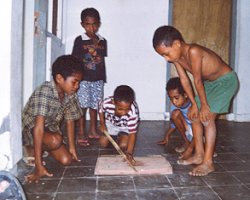

|
Alice Springs, March 2001.
MY LAST TWO DAYS IN DILI were full of tension, fear and tears.
On my second to last morning in East Timor, I had arranged to go into work at Futo to demonstrate how to use a new router that had recently arrived. I also intended to pick-up my toolbox with its few remaining hand tools I needed to start work with, back in NZ.
Quite early, I got a call saying that a nine-year-old neighbour boy had had a fatal accident at Futo. It wasn’t safe to go there because some of the family and friends of the dead child were holding Futo responsible and had broken the all windows and doors as well as looted the larger building. They had also threatened to kill Futo’s security man, as well as anyone else they could blame. I took a taxi over to Meno, my boss’, house where there were a dozen people looking discouraged and worried.
The accident involved a hydraulic forklift that had only just arrived in a shipping container of donated goods from New South Wales. The lift was intended to be part of a new concrete block-making project. Apparently, at around 5am, the boy had been playing around the forklift and was under the raised forks when the mechanism was released. It appears that he was caught across the neck with force.
Civpol, the UN civilian police had arrived and one of the Futo men, Liandro said he asked them to stay because feelings were running high. But the Civpols left and when they did, angry people sacked the main building. Liandro said he was surrounded by a mob looking for blood when another Civpol vehicle arrived and he escaped.
I felt unsafe, myself, even at Meno’s house three kms away, as one by one, frightened men arrived on foot, with further versions of disturbing events. There was talk of having to repaint the Futo truck, as it would become a target. When a carload of grim looking men pulled up at Meno’s gate, I realised I was no hero: I was eyeing up the shortest way over the wall. To my relief, they were friends.
After a couple of solemn hours and lots of discussion in Tetun, I could see no point in my staying. I said sad goodbyes to my friends whom I suspected I wouldn’t be seeing again, soon, knowing they were in strife. I was flying out the next day like a tourist, but they had nowhere else to go.
The next morning was the day of my departure. I walked up my street to say good-bye to Adriana, a neighbour and friend who had given me lunchtime Tetun lessons at Futo. As we were talking, she got a call that she was needed at Futo. I told her a friend of mine had a vehicle, so we piled in with my friend, who drove us to Futo, picking up Liandro on the way. He directed us to park around the back and before we knew it, he was leading the four of us into the neighbourhood. Adriana obviously knew where we were going, but my friend and I were quite startled when we found ourselves at the dead child’s house where the family and neighbours were grieving. I shook the weak grip of the boy’s father and then found myself in a cramped little room of people wailing their grief along with the boy’s mother in front of the small white open coffin. I recognised the boy: I’d seen him playing marbles with his mates around Futo.

We then went out the back of the house where Meno and Aires, Futo’s founder, was fronting up to the village chief and a circle of about 30 of the boy’s family and neighbours. Half a dozen people spoke in turn. I didn’t understand the specifics but it was clearly about the issues of responsibility and trying to get some resolution. I felt great respect for Meno and Aires for speaking well and for being there at all. The atmosphere was tense with a potential of physical threat. I felt things could have gone very bad, right there.
We left rather abruptly and Aires told me, as we wound our way back to Futo, that our further presence could have aggravated emotions. Some Futo men were loading of 200kgs of rice out a storeroom. They had agreed to pay the cost of the funeral, which included feeding many people for three days.
Other men removed the boarding that had been placed across the door of the room where my toolbox had been stored. To my surprise, box was still there. It had been broken into but none of my hand tools were missing.
As we loaded my box into my friend’s vehicle, Meno and Aires said they would get a taxi home, later. But just then, a carload of sour looking men drove up and did a slow, intimidating circuit of the Futo grounds. Meno was alarmed, saying these were ‘known troublemakers’. So he and Aires quickly crammed into our vehicle and we left. Aires said he was concerned there would be attempts at extortion and that he had thoughts of finding another site for Futo.
When we dropped Meno and Aires back at their house, we had a tearful, private goodbye with them and their family. It was not the cheery wave off at the airport I had envisioned.
My friend text messaged me in Darwin that night:
“Funeral v big, motorbikes @ front then long line of buses & big trucks ovrflowin with peopl, drivin v slo, w’ lites on. All traffic stopd. Yr mates @ front.”
I’m writing this during my stopover in the Alice Springs airport. It is plush, there is order. I feel so disoriented.
